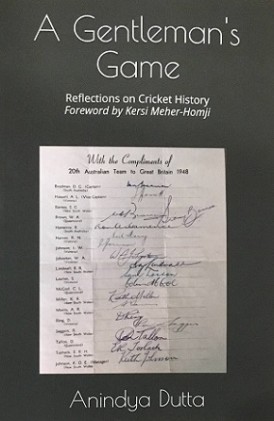A Gentleman’s Game
Martin Chandler |Published: 2017
Pages: 142
Author: Dutta, Anindya
Publisher: Private
Rating: 3 stars

Reading Anindya Dutta’s introduction to this, his first book, I realised that he and I have a good deal in common. Clearly we both have a deep rooted passion for cricket and, both having had to, for different reasons, give up playing some time ago we have both found an outlet in reading and writing about the game we love.
Having read this book, and its follow-up Spell-Binding Spells, whilst watching England secure a 2-2 draw at the Oval after the wreckage of the Old Trafford Test I did ponder whether I would judge Dutta differently now I knew he wasn’t a professional author. I have tried not to, but the fact that he is a banker rather than a trained journalist is not the sort of thing one can “unknow”, so perhaps I will make the odd subconscious allowance.
Dutta first made his writings available to a wider audience via a number of websites, Including The Roar, Cricinfo and Cricket Country. A Gentleman’s Game is a collection of 13 of those essays to which Dutta himself has added an introduction and the veteran Sydney based writer, Kersi Meher Homji, has provided a foreword as well as much encouragement along the way.
In common with all self-respecting cricket tragics Dutta does not confine himself to any one area of the world, or any one historical era. The subject matter of the various essays that appear in A Gentleman’s Game go back as far as Ranji, and then forward in the final essay to events that took place the year before the book was published. Somewhere in the middle Dutta tarries a while when he gets to 1948 and the Invincibles’ visit to England. It is one of his particular areas of interest, as evidenced by the book he published last year devoted to that historic series.
It is with Ranji that Dutta begins before moving on to a collection of war stories. Amongst others Lionel Tennyson and Bob Crisp get mentions here, but the most interesting part of that essay is the tribute to Keith Miller, which indeed is very probably the best piece of writing in the book.
Dutta goes on to ponder the worst declarations in the history of international game. I was slightly surprised that Gary Sobers’ Port-of-Spain effort in 1969 did not attract a mention – perhaps Dutta agrees with me that over the years Sobers has been unfairly traduced on that one.
The story is told of Bradman turning his batting order upside down in 1936/37, and a look at some famous catches that have been spilled over the years. Dutta also looks at some of the bulkiest men to have enjoyed distinguished cricketing careers and, across the whole of First Class game, nominates what he considers to be the five best bowling performance in history. They are an interesting selection.
It is then time for the Invincibles’ tour and an essay on the two side’s wicketkeepers. Much admired by Bradman the Australian ‘keeper was Don Tallon, and his opposite number the charismatic and spectacular Godfrey Evans. The next step after that for Dutta is the Emerald Isle and the humiliation inflicted on the 1969 West Indian tourists by Ireland at Sion Mills.
After Ireland the physical characteristics of cricketers appear again, this time Dutta’s focus being height rather than weight. That is followed in turn by a look at sportsmanship before Dutta closes by revisiting the 1948 series to tell the story of how he acquired a team sheet bearing the original signatures of all the tourists bar Sidney Barnes who, as was his wont, applied a rubber stamp instead of a pen.
And that dear reader is that, well at least it is after Dutta signs off with a brief closing note followed by 25 pages of scorecards illustrating the course of some of the matches he has described in the book. Without exception these essays are an enjoyable read, and easy on the eye and mind. I can confirm from personal experience that A Gentleman’s Game is an excellent way of spending the lunch and tea intervals of a Test match and it is certainly recommended.






Leave a comment